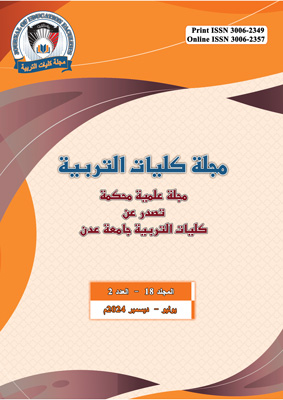A Proposal for Developing the Curriculums of Islamic Education in Secondary Schools in Yemen in Light of Contemporary Issues and its Effectiveness in the Achievement of First-Year Secondary School Students in Lahej Governorate
DOI:
https://doi.org/10.47372/jef.(2024)18.2.83Keywords:
Developi, Curriculums, Conntemporar, Issue, IslamicAbstract
The study aimed to build a proposed vision for developing the Islamic Education curriculum in secondary schools in Yemen in light of contemporary issues and its effectiveness in the achievement of first-year secondary school students in Lahej Governorate. To achieve the study's objective, the researcher used the descriptive survey method, the descriptive analytical method, and the quasi-experimental method. The researcher applied a questionnaire to a group of referees and experts in curricula and teaching methods, and used an observation card to analyze the content of the Islamic Education curriculum in classes (1st, 2nd, and 3rd) of secondary education in light of the standard units. The researcher also applied the achievement test to a sample of (36) first-year secondary school students in Habeel Al-Jaber district of Lahej Governorate.
The study reached to:
The absence of some contemporary issues and their standard units in the content of Islamic Education textbooks in all three classes of secondary education.
Building a proposed vision for developing the Islamic Education curriculum in secondary school stage in Yemen in light of contemporary issues.
There are statistically significant differences at the level of statistical significance (0.05) between the mean scores of first-year secondary school students in the pre-test and post-test of the achievement test in overall achievement at the levels (remembering, understanding, application) in favor of the post-test.
In light of the results, the study recommended the following:
Using the list of standards for contemporary issues in evaluating Islamic Education curricula for different educational stages.
Entering the content of the Islamic Education curriculum for the secondary stage with some of the contemporary issues that were reached in this study.
Adopting the developed Islamic Education curriculum in light of contemporary issues presented in the current study as a curriculum for Islamic Education for the first year of secondary school, and then continue to build the Islamic Education curriculum for the second and third years of secondary school.
The study suggests: carrying out a study to measure the effectiveness of the developed Islamic Education curriculum in light of contemporary issues in other educational stages in Yemen.
Directing those responsible for setting and following up on curricula and textbooks to include educational activities that develop contemporary issues among students and enhance their practice.
Downloads
Published
How to Cite
Issue
Section
License
Copyright (c) 2025 Journal of the Faculties of Education - University of Aden

This work is licensed under a Creative Commons Attribution-NonCommercial 4.0 International License.

